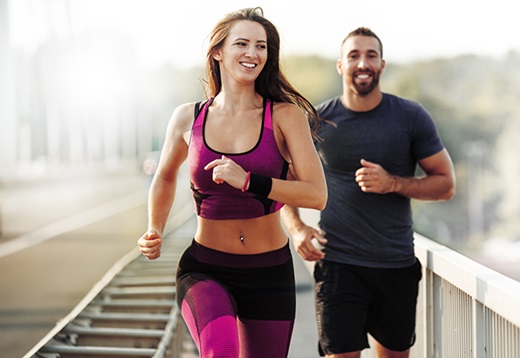Again This Is Something With a Lot of B in Bed Science Attached to It
Exercising for Better Sleep
Working out is great for your body and mind – and it can also help y'all go a good night'south sleep. Only, for some people, exercising too late in the day can interfere with how well they residuum at night.

Based on bachelor studies, "We have solid evidence that exercise does, in fact, help you fall asleep more quickly and improves sleep quality," says Charlene Gamaldo, M.D. , medical director of Johns Hopkins Center for Slumber at Howard Canton General Hospital. "But there'due south still some debate as to what time of day you lot should exercise. I encourage people to listen to their bodies to see how well they sleep in response to when they work out," she adds.
How Exercise May Aid You Sleep
Researchers don't completely understand how physical action improves sleep. "We may never be able to pinpoint the mechanism that explains how the two are related," she says.
However, we do know that moderate aerobic exercise increases the amount of slow wave sleep you lot get. Slow wave sleep refers to deep sleep, where the brain and body have a adventure to rejuvenate. Exercise can also help to stabilize your mood and decompress the mind, "a cerebral process that is important for naturally transitioning to sleep," says Gamaldo.
The Timing of Practice May Affair
Some people may find that exercising close to bedtime seems to keep them upward at night, says Gamaldo. How does working out impact the mind?
- Aerobic exercise causes the trunk to release endorphins.These chemicals can create a level of activeness in the brain that keeps some people awake. These individuals should exercise at least 1 to two hours before going to bed, giving endorphin levels time to launder out and "the brain fourth dimension to wind down," she says.
- Practise also raises your cadre body temperature. "The effect of do in some people is like taking a hot shower that wakes you upwards in the morn," says Gamaldo. Elevation in cadre torso temperature signals the body clock that information technology'south time to exist awake. Afterwards nigh 30 to xc minutes, the core body temperature starts to fall. The turn down helps to facilitate sleepiness.
Despite these biological responses to exercise, other people find that the time of day they practice doesn't make a difference. "Whether information technology'southward in the early forenoon or close to bedtime, they'll encounter a do good to their sleep," says Gamaldo.
"Know your body and know yourself," she says. "Doctors definitely want y'all to exercise, merely when you practise it is not scripted."
How Much Do You Need for Amend Sleep
Patients often enquire Gamaldo how much do they need for better sleep, and how many weeks, months or years it volition take to experience this benefit.
The good news: People who engage in at to the lowest degree 30 minutes of moderate aerobic exercise may see a divergence in sleep quality that same night. "Information technology's generally not going to have months or years to see a benefit," says Gamaldo. "And patients don't need to feel like they take to train for the Boston Marathon to become a improve sleeper."
Moreover, while many studies focus on aerobic activity and slumber, Gamaldo says picking an do you like will help you stick with it. For example, power lifting or an active yoga class tin elevate your heart rate, helping to create the biological processes in the brain and trunk that contribute to amend quality slumber, she says.
"We actually desire to encourage people to practice, just be mindful of timing and whether information technology seems to affect your ability to get optimal sleep quality," she says.
Inquiry Shows Practise Decreases Insomnia
Recent research indicates that exercise decreases sleep complaints and insomnia in patients. The furnishings of aerobic exercise on slumber appear to exist like to those of sleeping pills. However, more enquiry is needed to compare physical practice to medical treatments for indisposition.
Source: https://www.hopkinsmedicine.org/health/wellness-and-prevention/exercising-for-better-sleep
0 Response to "Again This Is Something With a Lot of B in Bed Science Attached to It"
Enregistrer un commentaire